情态动词和时态和语态
高中总复习二轮英语 核心语法必备 专题一 谓语动词(动词的时态、语态、主谓一致、情态动词和虚拟语气)

必
备
专题一 谓语动词(动词的时态、语态、 主谓一致、情态动词和虚拟语气)
英语
内容索引
要点精讲•破疑解难 对点演练•精准提升
要点精讲•破疑解难
重点一 热考的5种时态
考点1 一般现在时(am/is/are或do/does)
用法
例句
表示现在经常性、习惯性、 反复性的动作或状态
Susan talks every night in her dream. It
代词
单个的动词-ing形式、动词不定式或主语从句
重点一
重点二
重点三
重点四
原则
主语
谓语
由and连接的两个并列成分表示两个不同的概念
有生命的集体名词, 如people, police, cattle等 一些常用作复数或只有复数形式的名词, 如goods,
stairs,
arms等
复数
山脉、群岛、瀑布等以-s结尾的专有名词
重点一
重点二
重点三
重点四
提示 用过去完成时的常用句型: ①This/That/It was the first/second/... time+that 从句, 从句用过去完成时。 ② “Hardly/Scarcely had+主语+动词过去分词... when...” 及 “No sooner had+主语+动词过去分词... than...”, 主句用过去完成时, 从句用一般过去时。
By the time Jack returned home from
表示一个动作或状态从过去 England, his son had graduated from 某一时间之前已经开始, 一直 college. 持续到过去这一时刻的动作 杰克从英国回到家中时, 他的儿子已经大
时态语态情态动词用法小结
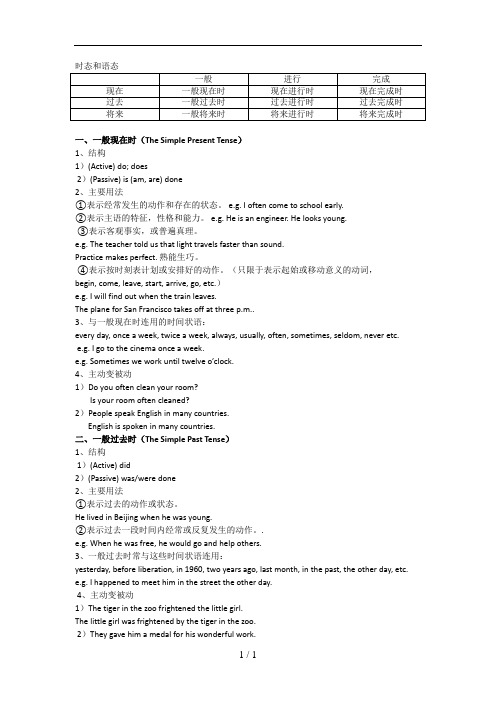
时态和语态一、一般现在时(The Simple Present Tense)1、结构1)(Active) do; does2)(Passive) is (am, are) done2、主要用法①表示经常发生的动作和存在的状态。
e.g. I often come to school early.②表示主语的特征,性格和能力。
e.g. He is an engineer. He looks young.③表示客观事实,或普遍真理。
e.g. The teacher told us that light travels faster than sound.Practice makes perfect. 熟能生巧。
④表示按时刻表计划或安排好的动作。
(只限于表示起始或移动意义的动词,begin, come, leave, start, arrive, go, etc.)e.g. I will find out when the train leaves.The plane for San Francisco takes off at three p.m..3、与一般现在时连用的时间状语:every day, once a week, twice a week, always, usually, often, sometimes, seldom, never etc. e.g. I go to the cinema once a week.e.g. Sometimes we work until twelve o’clock.4、主动变被动1)Do you often clean your room?Is your room often cleaned?2)People speak English in many countries.English is spoken in many countries.二、一般过去时(The Simple Past Tense)1、结构1)(Active) did2)(Passive) was/were done2、主要用法①表示过去的动作或状态。
情态动词的时态与语态变化规律解析
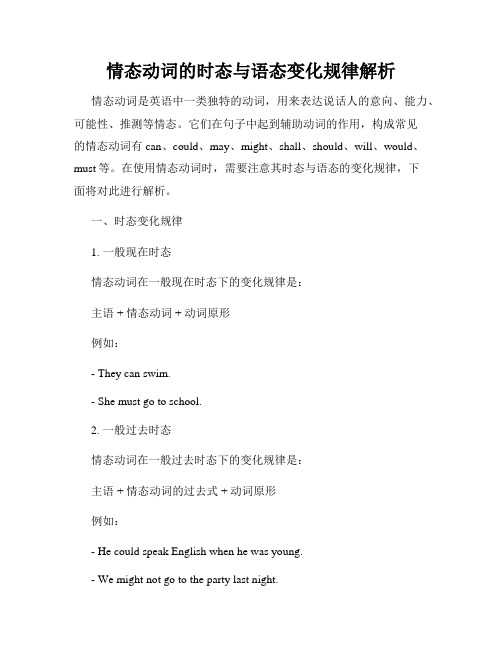
情态动词的时态与语态变化规律解析情态动词是英语中一类独特的动词,用来表达说话人的意向、能力、可能性、推测等情态。
它们在句子中起到辅助动词的作用,构成常见的情态动词有can、could、may、might、shall、should、will、would、must等。
在使用情态动词时,需要注意其时态与语态的变化规律,下面将对此进行解析。
一、时态变化规律1. 一般现在时态情态动词在一般现在时态下的变化规律是:主语 + 情态动词 + 动词原形例如:- They can swim.- She must go to school.2. 一般过去时态情态动词在一般过去时态下的变化规律是:主语 + 情态动词的过去式 + 动词原形例如:- He could speak English when he was young.- We might not go to the party last night.3. 一般将来时态情态动词在一般将来时态下的变化规律是:主语 + 情态动词 + 动词原形例如:- We will visit our grandparents tomorrow.- They may come to the party next week.4. 现在进行时态情态动词在现在进行时态下的变化规律是:主语 + be动词 + 情态动词的现在分词 + 其他动词例如:- She is canning the fruits.- They are maying to the beach.5. 过去进行时态情态动词在过去进行时态下的变化规律是:主语 + be动词的过去式 + 情态动词的现在分词 + 其他动词例如:- He was canning the fruits.- They were maying to the beach.二、语态变化规律1. 情态动词的主动语态情态动词的主动语态表示说话人的意愿、能力、可能性等,其变化规律与时态一致,即:主语 + 情态动词 + 动词原形例如:- He can swim.- They must finish the project.2. 情态动词的被动语态情态动词的被动语态表示说话人对某种行为的推测或可能性,其变化规律如下:主语 + 情态动词 + be动词的过去分词 + 其他动词例如:- The book can be read by everyone.- The food must be eaten before it spoils.综上所述,情态动词在使用时需要根据不同的时态与语态进行变化。
情态动词的用法总结
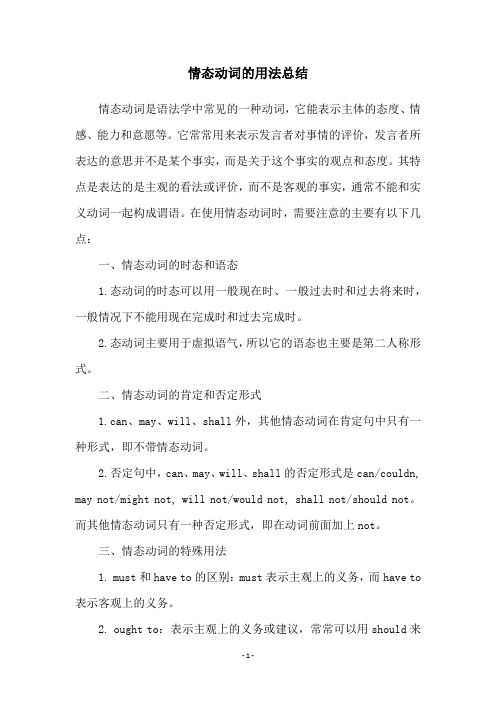
情态动词的用法总结情态动词是语法学中常见的一种动词,它能表示主体的态度、情感、能力和意愿等。
它常常用来表示发言者对事情的评价,发言者所表达的意思并不是某个事实,而是关于这个事实的观点和态度。
其特点是表达的是主观的看法或评价,而不是客观的事实,通常不能和实义动词一起构成谓语。
在使用情态动词时,需要注意的主要有以下几点:一、情态动词的时态和语态1.态动词的时态可以用一般现在时、一般过去时和过去将来时,一般情况下不能用现在完成时和过去完成时。
2.态动词主要用于虚拟语气,所以它的语态也主要是第二人称形式。
二、情态动词的肯定和否定形式1.can、may、will、shall外,其他情态动词在肯定句中只有一种形式,即不带情态动词。
2.否定句中,can、may、will、shall的否定形式是can/couldn, may not/might not, will not/would not, shall not/should not。
而其他情态动词只有一种否定形式,即在动词前面加上not。
三、情态动词的特殊用法1. must和have to的区别:must表示主观上的义务,而have to 表示客观上的义务。
2. ought to:表示主观上的义务或建议,常常可以用should来代替。
3. used to:表示一般过去某种状态,已不再存在。
4. be allowed to:表示被允许做某事。
5. be supposed to:表示应该做某事,但不一定要做;或者表示某事已经被认为是正确的或有意义的。
以上就是情态动词的用法总结,它们的功能及用法非常的重要,无论是作为口语考试,还是写作考试,情态动词都会被经常考查。
所以大家要把它们掌握牢固,在英语学习中能发挥出其最大的作用。
语法2情态动词及动词的时态语态

16) Jack _______ yet, otherwise he would have telephoned me. (97 上海卷) A. mustn’t have arrived B. shouldn’t have arrived
C. can’t have arrived D. need not have arrived 答案 C 17) “ Could I call you by your first name?” “ Yes, you _______.” A. will 答案 C B. could (98 上海卷) C. may D. might
4) The fire spread through the hotel very quickly, but everyone _______ get out. (NMET97) A. had to 答案 B. would C. could D. was able to
D 5) “When can I come for the photos? I need them tomorrow afternoon.” “They _______ be ready by 12:00.” (NMET 98) A. can 答案 B B. should C. might D. need
18) There was a lot of fun at yesterday’s party. You ______ come, but why didn’t you? (99 上海卷) A. must have C. need have 答案 D B. should D. ought to have
4、现在进行时: 1)、 have, be, hear, see, like, remember, find 及 sound等一般不用进行时。 2)、 go, come, start, leave及arrive可用进行时表 示将来。 3)、be always doing表示正在干…,常有责备或表扬 之意。 4)、be asking for trouble习惯都用进行时。
情态动词全部知识点总结
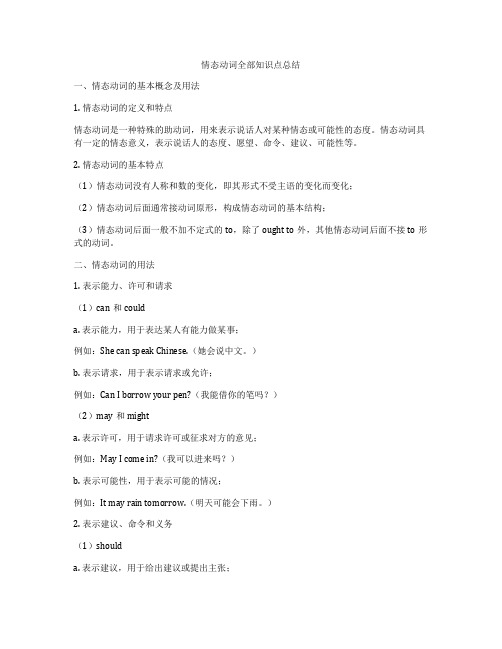
情态动词全部知识点总结一、情态动词的基本概念及用法1. 情态动词的定义和特点情态动词是一种特殊的助动词,用来表示说话人对某种情态或可能性的态度。
情态动词具有一定的情态意义,表示说话人的态度、愿望、命令、建议、可能性等。
2. 情态动词的基本特点(1)情态动词没有人称和数的变化,即其形式不受主语的变化而变化;(2)情态动词后面通常接动词原形,构成情态动词的基本结构;(3)情态动词后面一般不加不定式的to,除了ought to外,其他情态动词后面不接to形式的动词。
二、情态动词的用法1. 表示能力、许可和请求(1)can和coulda. 表示能力,用于表达某人有能力做某事;例如:She can speak Chinese.(她会说中文。
)b. 表示请求,用于表示请求或允许;例如:Can I borrow your pen?(我能借你的笔吗?)(2)may和mighta. 表示许可,用于请求许可或征求对方的意见;例如:May I come in?(我可以进来吗?)b. 表示可能性,用于表示可能的情况;例如:It may rain tomorrow.(明天可能会下雨。
)2. 表示建议、命令和义务(1)shoulda. 表示建议,用于给出建议或提出主张;例如:You should see a doctor.(你应该去看医生。
)b. 表示义务,用于表示责任或义务;例如:We should obey the law.(我们应该遵守法律。
)(2)ought toa. 表示责任或义务,用于表示应该做的事情;例如:You ought to apologize to her.(你应该向她道歉。
)3. 表示可能性和必然性(1)musta. 表示必然性,用于表示肯定的推断或必然的结论;例如:He must be at home now.(他现在一定在家。
)b. 表示义务,用于表示应遵守的规定或责任;例如:Students must wear school uniforms.(学生必须穿校服。
情态动词用法归纳

情态动词用法归纳一、引言(一)情态动词的定义和分类(二)情态动词的基本用法和特点二、情态动词的具体用法(一)can 和 could 的用法 1. 表示能力 2. 表示可能性 3. 表示请求和允许 4. 表示推测 5. could 的其他用法(二)may 和 might 的用法 1. 表示可能性 2. 表示请求和允许 3. 表示祝愿 4. might 的其他用法(三)must 和 have to 的用法 1. 表示必须 2. 表示推测 3. have to 的其他用法(四)should 和 ought to 的用法 1. 表示应该 2. 表示推测 3. 表示建议 4. 表示责任和义务(五)will 和 would 的用法 1. 表示意愿 2. 表示请求和邀请 3. 表示习惯和倾向性 4. 表示推测 5. would 的其他用法(六)shall 的用法 1. 用于第一人称表示将来 2. 用于第二、三人称表示命令、警告、允诺等 3. 用于征求意见(七)need 的用法 1. 作为情态动词的用法 2. 作为实义动词的用法(八)dare 的用法 1. 作为情态动词的用法 2. 作为实义动词的用法三、情态动词的时态和语态(一)情态动词的时态 1. 一般现在时 2. 一般过去时 3. 现在进行时 4. 过去进行时 5. 现在完成时 6. 过去完成时(二)情态动词的语态 1. 主动语态 2. 被动语态四、情态动词的否定形式和疑问形式(一)情态动词的否定形式 1. 直接在情态动词后加 not 2. 用情态动词的缩写形式加 not (二)情态动词的疑问形式 1. 将情态动词提前 2. 用情态动词的缩写形式提前五、情态动词的特殊用法(一)情态动词与其他动词的搭配 1. 情态动词+动词原形 2. 情态动词+be+形容词/名词3. 情态动词+have+过去分词(二)情态动词的省略 1. 在口语中,某些情态动词可以省略 2. 在某些情况下,情态动词的后面可以省略动词原形(三)情态动词的强调 1. 通过重读情态动词来强调 2. 使用 do/does/did 来强调六、情态动词的比较和区别(一)can 和 be able to 的区别 1. 表示能力时的区别 2. 时态和语态的区别(二)may 和 might 的区别 1. 表示可能性时的区别 2. 表示请求和允许时的区别(三)must 和 have to 的区别 1. 表示必须时的区别 2. 时态和语态的区别(四)should 和 ought to 的区别 1. 表示应该时的区别 2. 语气上的区别(五)will 和 would 的区别 1. 表示意愿时的区别 2. 表示习惯和倾向性时的区别(六)shall 和 will 的区别 1. 用于第一人称时的区别 2. 用于第二、三人称时的区别七、情态动词的练习和应用(一)情态动词的练习题 1. 选择题 2. 填空题 3. 改错题 4. 翻译题(二)情态动词的应用场景 1. 日常生活中的应用 2. 商务场合中的应用 3. 学术写作中的应用八、结论(一)情态动词的重要性和作用(二)情态动词的用法归纳和总结(三)对情态动词的进一步学习和研究的展望。
情态动词变化规则
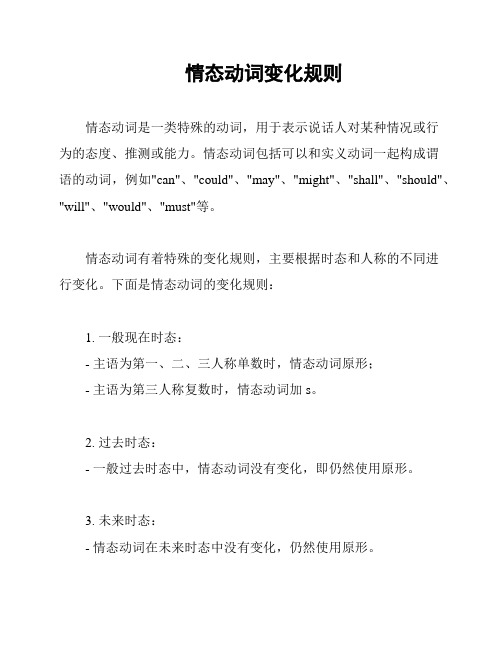
情态动词变化规则
情态动词是一类特殊的动词,用于表示说话人对某种情况或行
为的态度、推测或能力。
情态动词包括可以和实义动词一起构成谓
语的动词,例如"can"、"could"、"may"、"might"、"shall"、"should"、"will"、"would"、"must"等。
情态动词有着特殊的变化规则,主要根据时态和人称的不同进
行变化。
下面是情态动词的变化规则:
1. 一般现在时态:
- 主语为第一、二、三人称单数时,情态动词原形;
- 主语为第三人称复数时,情态动词加s。
2. 过去时态:
- 一般过去时态中,情态动词没有变化,即仍然使用原形。
3. 未来时态:
- 情态动词在未来时态中没有变化,仍然使用原形。
4. 否定形式:
- 情态动词的否定形式通常是在情态动词前加"not"。
5. 疑问形式:
- 在疑问句中,情态动词通常位于句首。
6. 被动语态:
- 构成被动语态时,情态动词后面接"be"动词的过去分词形式。
7. 完成时态:
- 情态动词没有自己的完成时态形式,但可以与"have"构成完
成时态。
需要注意的是,不同情态动词在不同语境中的用法也有所不同,具体用法需要根据具体语境进行判断。
以上是情态动词变化的基本规则,希望对您有所帮助。
情态动词知识点

情态动词知识点情态动词是英语中一类特殊的动词,用于表示说话人对某种动作或状态的态度、判断、推测或许可等。
它们在句子中往往与动词原形搭配使用,并起到修饰动词的作用。
情态动词在语法和用法上有一些特殊之处,下面将介绍情态动词的基本知识点。
一、情态动词的定义与种类情态动词是一类特殊的动词,用于表示说话人对某种动作或状态的态度、判断、推测或许可等。
常见的情态动词包括can, could, may, might, must, shall, should, will, would等。
它们都没有人称和数的变化,并且后面一般接动词原形。
二、情态动词的用法1. 表示能力或可能性例如:He can swim.(他会游泳。
)They may arrive early.(他们可能会早到。
)2. 表示许可或能力例如:Can I borrow your pen?(我能借用你的笔吗?)You may go now.(你现在可以走了。
)3. 表示推测或可能性例如:She might be busy.(她可能忙。
)They should arrive soon.(他们应该很快会到。
)4. 表示义务或建议例如:You must finish your homework.(你必须完成作业。
)We should recycle.(我们应该回收。
)5. 表示意愿或请求例如:I will help you.(我会帮你的。
)Would you please close the window?(你能请关窗户吗?)三、情态动词与时态的搭配情态动词本身没有时态,它们与后面的动词共同表达时间和语态的变化。
一般情况下,情态动词后面接动词原形,表示动作或状态的不同时间和语态变化由后面的动词来表达。
例如:- He can play the piano.(他会弹钢琴。
)- He could play the piano.(他过去会弹钢琴。
)- He will be able to play the piano.(他将来会会弹钢琴。
动词详解3

评了。 A bridge should be built here. 这儿应该建座桥。
现在时
过去时
将来时
语态
主动语态
一般时
完成时
进行时
被动语态
以I clean the house为例
I clean the house.
I cleaned the house yesterday.
一般现在时(第三人称单数加 s)
一般过去时(v-ed,见表格)
I will clean the house
将来完成时(will have done)
过去将来时(would do/ was/were going to do)
过去将来完成时(would have done, “本想做但并 未做” )
以I clean the house为例
I have been cleaning the house for 3 hours.
house at this time
tomorrow.
将来进行时(will be doing)
以I clean the house为例
I have cleaned the house for 3 hours.
I had cleaned the house before I cooked.
I will have cleaned the house by 10 tonight.
tomorrow.
一般将来时(will/be going to
I am cleaning the house. do)
I was cleaning the house at this time yesterday. 现在进行时(be doing)
情态动词和时态和语态
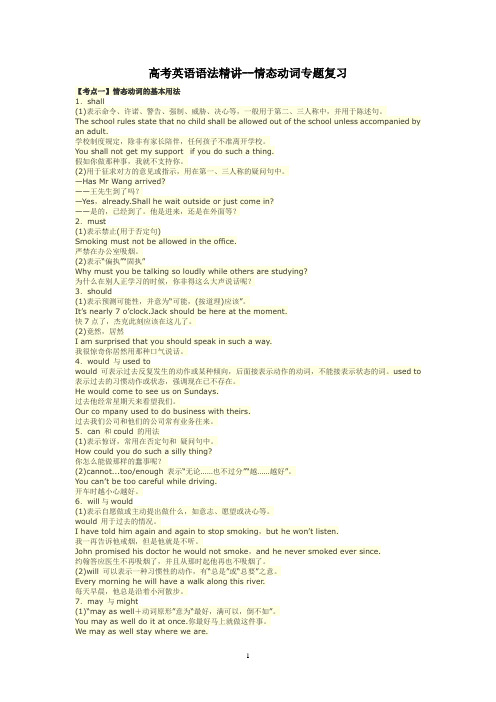
高考英语语法精讲--情态动词专题复习【考点一】情态动词的基本用法1.shall(1)表示命令、许诺、警告、强制、威胁、决心等,一般用于第二、三人称中,并用于陈述句。
The school rules state that no child shall be allowed out of the school unless accompanied by an adult.学校制度规定,除非有家长陪伴,任何孩子不准离开学校。
You shall not get my support if you do such a thing.假如你做那种事,我就不支持你。
(2)用于征求对方的意见或指示,用在第一、三人称的疑问句中。
—Has Mr Wang arrived?——王先生到了吗?—Yes,already.Shall he wait outside or just come in?——是的,已经到了。
他是进来,还是在外面等?2.must(1)表示禁止(用于否定句)Smoking must not be allowed in the office.严禁在办公室吸烟。
(2)表示“偏执”“固执”Why must you be talking so loudly while others are studying?为什么在别人正学习的时候,你非得这么大声说话呢?3.should(1)表示预测可能性,并意为“可能,(按道理)应该”。
It’s nearly 7 o’clock.Jack should be here at the moment.快7点了,杰克此刻应该在这儿了。
(2)竟然,居然I am surprised that you should speak in such a way.我很惊奇你居然用那种口气说话。
4.would 与used towould 可表示过去反复发生的动作或某种倾向,后面接表示动作的动词,不能接表示状态的词。
动词的基本用法

动词的基本用法动词是语言中最基本的词类之一,它在句子中担任着非常重要的角色。
本文将介绍动词的基本用法,包括时态、语态、情态动词以及常见的动词短语。
一、时态1. 现在时:表示目前正在进行或经常发生的动作。
例如,“I eat an apple every day.”(我每天吃一个苹果。
)2. 过去时:表示过去某个时间发生的动作。
例如,“He played football yesterday.”(他昨天踢足球。
)3. 将来时:表示将来某个时间会发生的动作。
例如,“We will go to the park tomorrow.”(我们明天会去公园。
)4. 完成时:表示过去某个时间已经完成的动作。
例如,“She has finished her homework.”(她已经完成了她的家庭作业。
)5. 进行时:表示正在进行的动作。
例如,“They are watching a movie now.”(他们正在看电影。
)二、语态1. 主动语态:表示主语是动作的执行者。
例如,“The boy kicked the ball.”(男孩踢了足球。
)2. 被动语态:表示主语是动作的承受者。
例如,“The ball was kicked by the boy.”(足球被男孩踢了。
)三、情态动词情态动词是一类辅助动词,用于表示能力、意愿、推测等情态或语气。
常见的情态动词包括can、could、may、might、will、would、shall、should、must等。
1. 能力:- can表示能力或许可。
例如,“I can swim.”(我会游泳。
)- could表示过去的能力。
例如,“When I was young, I could climb trees.”(当我年轻的时候,我会爬树。
)2. 意愿:- will表示意愿、决心或承诺。
例如,“I will help you with your homework.”(我会帮你做作业的。
情态动词在句子中可以表达不同的语气和态度

情态动词在句子中可以表达不同的语气和态度
情态动词在句子中可以表达不同的语气和态度,具体如下:
1.肯定语气与语调:当表示真实的事实、可以实现的可能性或肯定的推测时,
可以使用肯定语气与语调。
情态动词如“can”、“will”、“should”等都可以表达一种肯定的态度,语调也显得肯定而确定。
2.否定语气与语调:当表示不可能的事实、不可能实现的可能性或否定的推
测时,可以使用否定语气与语调。
情态动词如“cannot”、“wouldn't”、“shouldn't”等都可以表达一种否定的态度,语调也显得否定而坚决。
3.时态和语态:情态动词的时态和语态也可以表达不同的语气和态度。
例如,
“I could have done better”(我本可以做得更好),“He might be gone”(他可能已经走了)。
在这些句子中,情态动词的过去式或完成式表达了一种对过去事件的推测或评价,语调显得婉转或者遗憾。
4.与助动词的搭配使用:情态动词可以与其他助动词搭配使用,表达不同的
语气和态度。
例如,“You should have done it”(你应该已经做了这件事情),“They are going to have to leave soon”(他们将不得不早点离开)。
在这些句子中,情态动词与其他助动词的搭配使用,表达了一种对未来事件的推测或评价,语调显得委婉或者强调。
综上所述,通过使用不同的情态动词、时态、语态以及与其他助动词的搭配,可以灵活地表达不同的语气和态度,使语言更加丰富、准确和有力。
情态动词 时态 语态

情态动词☆ 定义:这类词本身虽有意义,但不完整。
它们表示说话人的能力、说话人的语气或情态,如“可能”、“应当”等。
这类动词有等。
☆ 原则:它们不能单独作谓语,必须与动词一起作谓语,表示完整的意思;人称和数的变化;否定直接加not.★ 用法:强调主观;强调客观;强调需要并只用于句或(1) 表义务:句。
(2)表指责:(不能), (不应该), (不准)。
(3) 表猜测:分为两大类,和。
★肯定猜测:, , (从左至右语气减弱)。
★否定猜测:, , (从左至右语气减弱)。
拓展:★对现在、一般情况猜测:情态动词+ 。
例句:Theymustbeintheclassroomnow!He may not be at home at this time.Something must be wrong with the TV set.★对过去猜测:情态动词+ 。
例句: The road is wet. It must have rained just nowHe must haven’t finished homework yesterday, because his mom seemed to be angry.(4) 表能力:(现在), (过去能现在能), (过去能,现在未必能)。
(5) 表请求:(语气生硬), (委婉,常用), (谦卑,少用), (只用于第一人称)。
(6) 肯否不一:★may回答:肯定回答,否定回答。
★must/need回答:肯定回答,否定回答。
★can/could回答:肯定回答,否定回答。
动词时态★ 一般现在时1. 定义:表现在的状态,经常的动作,。
2. 标志词:频率副词:, , , ,固定次数:, ,3. 考点:(1) 主将从现或引导的条件状语从句:Ifyoudon’tlistentome, Iwillreadthespell.(2) 客观真理、事实用一般现在时(太阳、月亮的升起、落下,定律等)Wherethere (be) awill, there (be) a way. 唐僧说,有志者,事竟成。
动词 用法
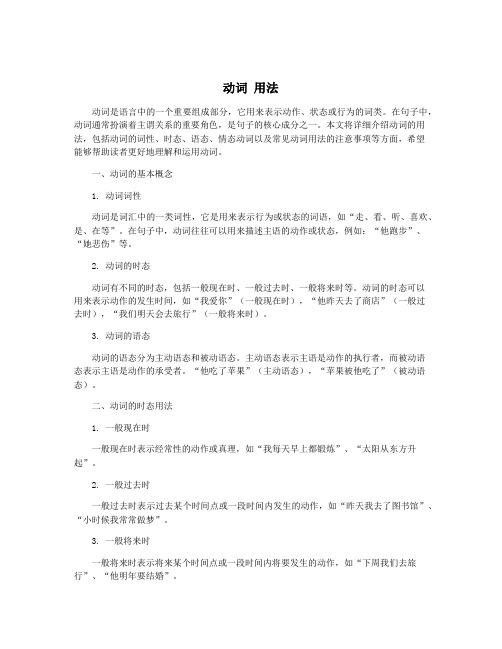
动词用法动词是语言中的一个重要组成部分,它用来表示动作、状态或行为的词类。
在句子中,动词通常扮演着主谓关系的重要角色,是句子的核心成分之一。
本文将详细介绍动词的用法,包括动词的词性、时态、语态、情态动词以及常见动词用法的注意事项等方面,希望能够帮助读者更好地理解和运用动词。
一、动词的基本概念1. 动词词性动词是词汇中的一类词性,它是用来表示行为或状态的词语,如“走、看、听、喜欢、是、在等”。
在句子中,动词往往可以用来描述主语的动作或状态,例如:“他跑步”、“她悲伤”等。
2. 动词的时态动词有不同的时态,包括一般现在时、一般过去时、一般将来时等。
动词的时态可以用来表示动作的发生时间,如“我爱你”(一般现在时),“他昨天去了商店”(一般过去时),“我们明天会去旅行”(一般将来时)。
3. 动词的语态动词的语态分为主动语态和被动语态。
主动语态表示主语是动作的执行者,而被动语态表示主语是动作的承受者。
“他吃了苹果”(主动语态),“苹果被他吃了”(被动语态)。
二、动词的时态用法1. 一般现在时一般现在时表示经常性的动作或真理,如“我每天早上都锻炼”、“太阳从东方升起”。
2. 一般过去时一般过去时表示过去某个时间点或一段时间内发生的动作,如“昨天我去了图书馆”、“小时候我常常做梦”。
3. 一般将来时一般将来时表示将来某个时间点或一段时间内将要发生的动作,如“下周我们去旅行”、“他明年要结婚”。
4. 现在进行时现在进行时表示现在正在进行的动作,如“她正在读书”、“他们正在做饭”。
5. 过去进行时过去进行时表示过去某个时间点或一段时间内正在进行的动作,如“他昨天上午正在工作”、“我们去年这个时候正在旅行”。
6. 将来进行时将来进行时表示将来某个时间点或一段时间内将要进行的动作,如“下周这个时候我们将正在度假”、“明年他们将在这里建造一座桥”。
7. 现在完成时现在完成时表示过去某个时间点或一段时间内发生的动作对现在产生的影响,如“我已经完成了作业”、“她到目前为止还没回来”。
情态动词在语法中的作用与用法
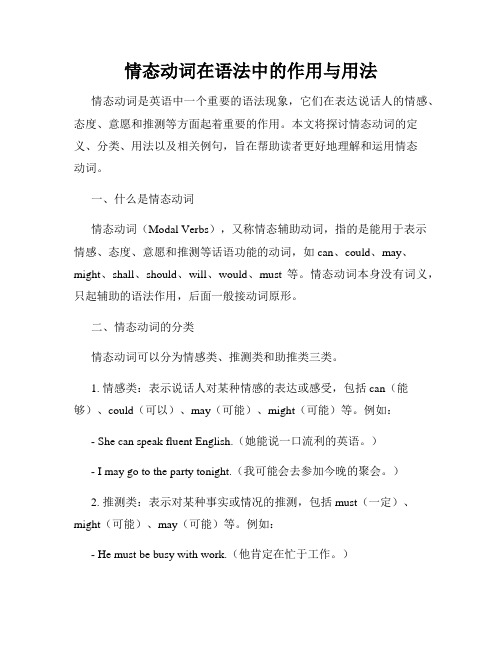
情态动词在语法中的作用与用法情态动词是英语中一个重要的语法现象,它们在表达说话人的情感、态度、意愿和推测等方面起着重要的作用。
本文将探讨情态动词的定义、分类、用法以及相关例句,旨在帮助读者更好地理解和运用情态动词。
一、什么是情态动词情态动词(Modal Verbs),又称情态辅助动词,指的是能用于表示情感、态度、意愿和推测等话语功能的动词,如can、could、may、might、shall、should、will、would、must等。
情态动词本身没有词义,只起辅助的语法作用,后面一般接动词原形。
二、情态动词的分类情态动词可以分为情感类、推测类和助推类三类。
1. 情感类:表示说话人对某种情感的表达或感受,包括can(能够)、could(可以)、may(可能)、might(可能)等。
例如:- She can speak fluent English.(她能说一口流利的英语。
)- I may go to the party tonight.(我可能会去参加今晚的聚会。
)2. 推测类:表示对某种事实或情况的推测,包括must(一定)、might(可能)、may(可能)等。
例如:- He must be busy with work.(他肯定在忙于工作。
)- It might rain tomorrow.(明天可能会下雨。
)3. 助推类:表示使某种行为成为可能、必须或应该的态度,包括shall(将要)、should(应该)、will(将要)等。
例如:- You should finish your homework before going out.(你应该在出门前完成作业。
)- We will help you with the move.(我们会帮你搬家的。
)三、情态动词的用法情态动词具有一些独特的语法用法,需要注意以下几点。
1. 情态动词后面一般接动词原形,不带to。
例如:can do、must go。
中考英语 专题七 动词的分类、时态、语态、非谓语动词、情态动词

第一讲动词的分类动词是表示动作或状态的词。
句子中的谓语成分是由动词充当的,谓语通常是句中不可缺少的成分,因此动词是英语词类中最重要的一种。
动词可以通过本身的变化来表示动作发生的时间以及说话人的语气、态度等。
1.动词的种类动词按其词义和在句中的作用可以分为:行为动词(或称实义动词)、连系动词、助动词和情态动词。
1)行为动词又可分为及物动词(vt.)和不及物动词(vi.)两种。
及物动词作谓语,后面必须跟宾语意思才完整。
不及物动词作谓语,后面不能跟宾语,只有加上介词后才可接宾语。
2)英语中有些动词常常是既作及物动词又作不及物动词;既作连系动词工作及物动词。
例如:He speaks English very well. (vt.)He spoke at the meeting. (vi.)另外,动词按其在句中能否作谓语,又可分为谓语动词(finite verb)和非谓语动词(non-finite verb)两大类。
说明:谓语动词又称限定动词,非谓语动词又称非限定动词。
非谓语动词初中阶段主要学习动词不定式的用法。
2.动词的基本形式英语动词有五种基本形式,即动词原形、过去式、过去分词、现在分词和第三人称单数形式。
如:work—worked—worked—working—works。
它们的构成及说明:1)词尾-ed在清辅音后读[t];在浊辅音和元音后读[d];在[t]和[d]后读[id]。
2)词尾-es或-s在[s ]、[z]、[t ]、[d ]后面读[iz];在清辅音后读[s];在浊辅音及元音后读[z];在[t],[d]后读[ts]、[dz]。
3)不规则动词的过去式与过去分词则要根据不规则动词表逐渐记住。
第二讲动词的时态1.一般现在时1)构成动词一般现在时,除主语为单数第三人称以外,谓语动词一律用原形,若主语为第三人称单数,则谓语动词的词尾应发生变化(加-s或-es)。
另外be和have 有特殊的人称变化形式。
2024年高考真题和模拟题英语分类汇编:专题02 动词的时态、语态、情态动词、虚拟语气(解析版)
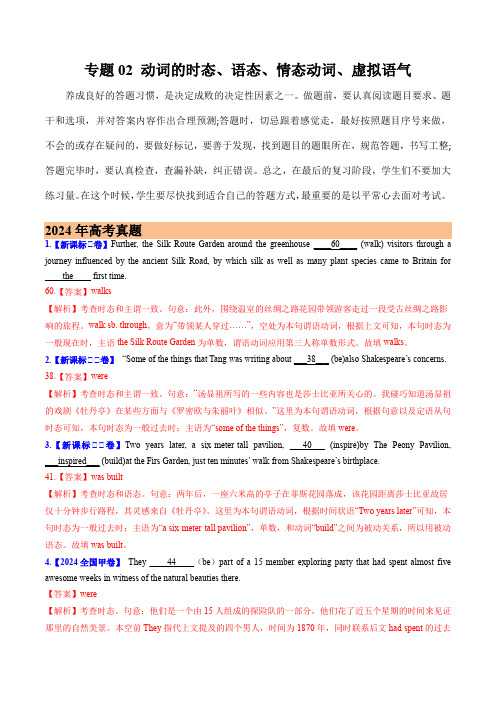
专题02 动词的时态、语态、情态动词、虚拟语气养成良好的答题习惯,是决定成败的决定性因素之一。
做题前,要认真阅读题目要求、题干和选项,并对答案内容作出合理预测;答题时,切忌跟着感觉走,最好按照题目序号来做,不会的或存在疑问的,要做好标记,要善于发现,找到题目的题眼所在,规范答题,书写工整;答题完毕时,要认真检查,查漏补缺,纠正错误。
总之,在最后的复习阶段,学生们不要加大练习量。
在这个时候,学生要尽快找到适合自己的答题方式,最重要的是以平常心去面对考试。
2024年高考真题1.【新课标Ⅰ卷】Further, the Silk Route Garden around the greenhouse ____60____ (walk) visitors through a journey influenced by the ancient Silk Road, by which silk as well as many plant species came to Britain for ____the____ first time.60.【答案】walks【解析】考查时态和主谓一致。
句意:此外,围绕温室的丝绸之路花园带领游客走过一段受古丝绸之路影响的旅程。
walk sb. through,意为“带领某人穿过……”,空处为本句谓语动词,根据上文可知,本句时态为一般现在时,主语the Silk Route Garden为单数,谓语动词应用第三人称单数形式。
故填walks。
2.【新课标ⅠⅠ卷】“Some of the things that Tang was writing about ___38___ (be)also Shakespeare’s concerns.38.【答案】were【解析】考查时态和主谓一致。
句意:“汤显祖所写的一些内容也是莎士比亚所关心的。
我碰巧知道汤显祖的戏剧《牡丹亭》在某些方面与《罗密欧与朱丽叶》相似。
情态动词用法归纳全解

疑问句构成及回答方式
一般疑问句
将情态动词提到句首,如“Can you speak English?”(你会说英语吗?)回答时一般 用yes或no,如“Yes, I can.”(是的,我会 。)
反意疑问句
在陈述句后面加上一个简短的疑问句,如 “He can swim, can't he?”(他会游泳, 不是吗?)回答时根据实际情况进行回答。
对主语提问
当主语是人时,可以用who或whom来提问;当主语是物时,可以用what来提问。同时要注意语序的调整 ,如“Who must go there?”(谁必须去那里?)
对时间、地点等状语提问
用when、where等疑问词来提问,并根据需要调整语序,如“When must we arrive?”(我们必须在什 么时候到达?)
使用"might"来表示更委婉、更不确定的建议, 如"You might want to consider another option."(您可能需要考虑另一个选项。)
使用情态动词的过去式来表达礼貌性请求,如 "Would you mind closing the window?"( 你介意关上窗户吗?)
禁止性规定或命令执行场景
使用"must not"或"can't"来表示禁止性规定或命令, 如"You must not smoke here."(你不能在这里吸烟
。)
使用"don't have to"来表示不必做某事,如"You don't have to come if you don't want to."(Fra bibliotek果作用
- 1、下载文档前请自行甄别文档内容的完整性,平台不提供额外的编辑、内容补充、找答案等附加服务。
- 2、"仅部分预览"的文档,不可在线预览部分如存在完整性等问题,可反馈申请退款(可完整预览的文档不适用该条件!)。
- 3、如文档侵犯您的权益,请联系客服反馈,我们会尽快为您处理(人工客服工作时间:9:00-18:30)。
高考英语语法精讲--情态动词专题复习【考点一】情态动词的基本用法1.shall(1)表示命令、许诺、警告、强制、威胁、决心等,一般用于第二、三人称中,并用于陈述句。
The school rules state that no child shall be allowed out of the school unless accompanied by an adult.学校制度规定,除非有家长陪伴,任何孩子不准离开学校。
You shall not get my support if you do such a thing.假如你做那种事,我就不支持你。
(2)用于征求对方的意见或指示,用在第一、三人称的疑问句中。
—Has Mr Wang arrived?——王先生到了吗?—Yes,already.Shall he wait outside or just come in?——是的,已经到了。
他是进来,还是在外面等?2.must(1)表示禁止(用于否定句)Smoking must not be allowed in the office.严禁在办公室吸烟。
(2)表示“偏执”“固执”Why must you be talking so loudly while others are studying?为什么在别人正学习的时候,你非得这么大声说话呢?3.should(1)表示预测可能性,并意为“可能,(按道理)应该”。
It’s nearly 7 o’clock.Jack should be here at the moment.快7点了,杰克此刻应该在这儿了。
(2)竟然,居然I am surprised that you should speak in such a way.我很惊奇你居然用那种口气说话。
4.would 与used towould 可表示过去反复发生的动作或某种倾向,后面接表示动作的动词,不能接表示状态的词。
used to 表示过去的习惯动作或状态,强调现在已不存在。
He would come to see us on Sundays.过去他经常星期天来看望我们。
Our co mpany used to do business with theirs.过去我们公司和他们的公司常有业务往来。
5.can 和could 的用法(1)表示惊讶,常用在否定句和疑问句中。
How could you do such a silly thing?你怎么能做那样的蠢事呢?(2)cannot...too/enough 表示“无论……也不过分”“越……越好”。
You can’t be too careful while driving.开车时越小心越好。
6.will与would(1)表示自愿做或主动提出做什么,如意志、愿望或决心等。
would 用于过去的情况。
I have told him again and again to stop smoking,but he won’t listen.我一再告诉他戒烟,但是他就是不听。
John promised his doctor he would not smoke,and he never smoked ever since.约翰答应医生不再吸烟了,并且从那时起他再也不吸烟了。
(2)will 可以表示一种习惯性的动作,有“总是”或“总要”之意。
Every morning he will have a walk along this river.每天早晨,他总是沿着小河散步。
7.may 与might(1)“may as well+动词原形”意为“最好,满可以,倒不如”。
You may as well do it at once.你最好马上就做这件事。
We may as well stay where we are.我们留在现在的地方倒也不错。
(2)may 作“可以”讲时,其否定式常用“mustn’t”表示“禁止”;must 作“必须”讲时,其否定式是“needn’t”,表示“不必”。
—May I use your car?—No,you mustn’t.(委婉的拒绝可用:Sorry,but I am using it now.或You’d better not.等) —Must I work out the problem tonight?—No,you needn’t.【经典考题】1. —I haven’t got the reference book yet,but I’ll have a test on the subject next month.—Don’t worry.You________have it by Friday.A.could B.shallC.must D.may解析:句意为:——我至今还没有拿到参考书,但是下个月这个学科就要测试了。
——别担心,周五之前你一定会有的。
本题考查情态动词。
shall 用于第二人称表示允诺、要求、命令、威胁等语气,根据句意可知此处表示允诺的语气,故答案为B。
could 能,能够;must 必须;may 也许,均不符合语境,可排除。
答案:B2.(2011?潍坊质量监测)When we worked in the same firm several years ago,we________often go to the cinema together.A.would B.willC.shall D.could解析:考查情态动词。
句意为:当几年前我们在同一家公司工作时,我们常常一起去电影院。
would 这里表示(过去)常常。
答案:A3.For environmental reasons,we ________as well take these waste products and have them recycled.A.should B.wouldC.might D.could解析:考查情态动词。
根据语意,这里表示“我们只好把这些废弃产品收起来并回收利用”,固定表达may/might as well 意为“使……倒也无妨,只好做”,由此我们不难判断这里选C项。
答案:C4.—Will it take me long to get to the Sunshine Hotel?—No,it________take you long.It’s not the rush hour now.A.shouldn’t B.shan’tC.mustn’t D.needn’t解析:考查情态动词。
根据应答句的后一分句可知所填词意思是:不应该,选A。
答案:A【考点二】情态动词表“推测”1.can 用于肯定句中有时可以用来表示推测,意为“有时会”;用于疑问句中可以表示推测,意为“可能”,有时表示一种惊讶的语气;用于否定句中也可以表示推测,can’t 意为“不可能”,语气很强烈。
Mr Bush is on time for everything.How can it be that he was late for the meeting?布什先生做什么事情都很准时,他怎么可能迟到会议呢?It is usually warm in my hometown in March,but it can be rather cold sometimes.我的家乡通常在三月份很暖和,但有时会相当冷。
2.may,might用于肯定句中可以用来表示推测,意为“可能”;用于否定句中也可以表示推测,may not 意为“可能不”,表示一种不太确定的语气。
The traffic is heavy these days.I might arrive a bit late,so could you save me a place?最近这些天交通拥挤。
我有可能迟到一会儿,因此请你给我留个位子好吗?(2008?全国卷Ⅱ)Liza may well not want to go on the trip—she hates traveling.莉莎可能不想去旅行,她厌恶旅行。
3.must 表示推测时只能用于肯定句中,意为“一定,必定”,表示十分肯定的(在疑问句中或否定句中要用can)。
—Hi,Tom.Any idea where Jane is?—She must be in the classroom.I saw her there just now.——嗨,Tom,你知道Jane在哪儿吗?——她肯定在教室里,我刚才在那儿看到她了。
4.should 用来表示推测时意为“应该”,即含有“按道理来说应当如此”的意思。
The public transport in Beijing is very convenient,so there shouldn’t be any difficulty intraveling around the city.现在北京的公共交通非常便利,所以在市区观光不应该有什么困难。
【经典考题】1. “You________have a wrong number,” she said,“There’s no one of that name here.”A.need B.canC.must D.would解析:句意为:“你肯定打错电话了,”她说,“这儿没有叫那个名字的人。
”考查情态动词。
此处情态动词表推测,由语境可知说话人对推测的事情把握较大,所以用must(肯定,一定)。
答案:C2.—I think I’ll give Bob a ring.—You________.You haven’t been in touch with him for ages.A.will B.mayC.have to D.should解析:考查情态动词的用法。
根据题意可知,这里选择should的意思是“应该”。
这句话的意思是:你应该这样做(即给Bob打个电话),你们都多年没有联系了。
答案:D3.—When shall we hold the meeting?—It________be better to put it off until next week.A.must B.couldC.can D.will解析:考查情态动词。
此处could表示可能性、推测:说不定会。
如:It could be better to stay here.说不定呆在这里比较好。
答案:B【考点三】情态动词+have done1.can/could have done表示“本来可以做,而实际上未做”或者“过去可能”,疑问或否定形式表示对过去发生的行为表示怀疑或不肯定,其中can’t have done 多用于语气强烈的否定,意为“不可能做过”。
